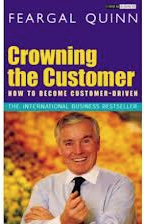In the Dublin of my boyhood, the Superquinn brand was truly a household name. Particularly in our household, where my mother, who knew the value of things, repeatedly chose to turn left out of our home near the Children's Hospital to shop in her favourite store in Walkinstown, rather than right to the nearby Crumlin Shopping Centre with its shiny new Quinnsworth (now Tesco).
I've written previously in Open-Heart Branding (
When It All Adds Up) of the extraordinary retail brand that Feargal Quinn built in the sixties and seventies, and his amazing feat of persuading cash-strapped housewives to see the real value in shopping at his stores, where great food, innovative offers and exceptional service were available at a premium. Feargal had so much faith in his own offer that he knew he didn't need to compete on price.
As an artisan brand-builder myself, and a keen student of the great brands, I read and re-read his book
Crowning The Customer, in which he describes the simple but difficult task of putting the customer first, and of crafting an offer laden with value which can be readily appreciated by the customer. And by appreciated, I mean ready to pay for it, and pay handsomely too.
And in these difficult economic circumstances, I often use the example of the Superquinn of my boyhood to inspire those clients of mine who are inclined to lose faith in the quality of their own offer in the mistaken belief that customers cannot appreciate the value in it. If Feargal Quinn could persuade the hard-pressed but savvy housewives of seventies' Dublin to spend their money wisely with him, I say, then surely there's a place in your marketplace for products and services that crown the customer in much the same way.
And yet I was unsurprised by last month's news (
Superquinn Brand To Be Dropped By New Owners) that recent buyers Musgraves plan to rebrand the 24 Superquinn stores as Supervalu.
Unsurprised, because I believe that Superquinn, having crowned the customer triumphantly throughout the seventies and eighties, lost faith in the value of its own offer when the competition upped the ante in the nineties, and surreptitiously stole back the customer's golden crown to replace it with a shiny but copper-based replica, the classic fool's gold.
I trace it back to an apparently innocuous event, sometime in the late nineties, at the entrance to our local store. It probably seemed like a good idea at the time, but it heralded the beginning of the end of the great Superquinn brand. There it stood, a simple supermarket trolley, packed with the mix of products you'd typically find on a weekly household shopping list. Attached to it was the legend proclaiming that the cost of the products in this Superquinn trolley was as cheap as those to be found in its Dunnes or Tesco equivalents.
Now, I knew that this was probably true in this case - I had no doubt the local shop-manager had carefully researched and assembled this particular trolley-load of goods so that it would bear comparison - but that wasn't the point. I knew that it wasn't true in general.
In one clumsy gesture, Superquinn had swiped the crown from the customer. Remember that Feargal Quinn had always appealed to the intelligence of the savvy shopper, and in doing so had created a very grown-up brand. No cheap tricks for Feargal. My mother knew that she was being charged a premium, and she was happy to pay it. The last thing the savvy customer needs is to have their intelligence and loyalty insulted. Because, whilst it was almost certainly true that the particular trolley-load in question was as cheap as its competitors, the customer knew that shopping in Superquinn once came with a bold premium attached: a premium on great food, innovative products and exceptional service that they had agreed was worth paying for.
Superquinn, which had achieved the near-impossible task of creating value in a cash-poor economy, managed to destroy that same value in the cash-rich (and growing richer) society of late nineties' Ireland. Fool's gold indeed.
They may have lured in a few carpet-baggers on the heels of their sleight-of-hand, and perhaps they turned a quick profit, but from then on the Superquinn brand lost its lustre and became just one of many retailers hawking their wares to a critical customer, and competing on price.
And so I was unsurprised to see that the brand's new owners don't see the value in retaining the Superquinn name. In many ways, their own Supervalu brand, which champions local producers and personal service, had already stolen a march on a brand that lost faith in its own values, and the value it offered its customers as a result.
Others too have taken a lead from Crowning The Customer, and Irish retail has a number of young pretenders vying for the Superquinn crown. But as a child of the seventies, I still think it's a terrible pity that one of the few Irish brands from that time that could truly claim greatness, has fallen from grace and become largely irrelevant to the customer of today.
Over To You: Do you think it's possible to create a brand today that doesn't compete on price? Do any other Irish brands (emerging or established) come to mind?
 Recently I heard the story of a P.A who, after selflessly working thirty hours unpaid overtime to facilitate an office move, was handed an envelope from her boss with a mumbled thanks. Inside was a €50 voucher for Argos (and to add insult to injury, the voucher had been purchased ten months previously). The ‘gift’ was met with incredulity and a resolve never to work a minute of unpaid overtime again.
Recently I heard the story of a P.A who, after selflessly working thirty hours unpaid overtime to facilitate an office move, was handed an envelope from her boss with a mumbled thanks. Inside was a €50 voucher for Argos (and to add insult to injury, the voucher had been purchased ten months previously). The ‘gift’ was met with incredulity and a resolve never to work a minute of unpaid overtime again. 














